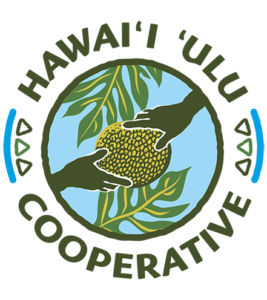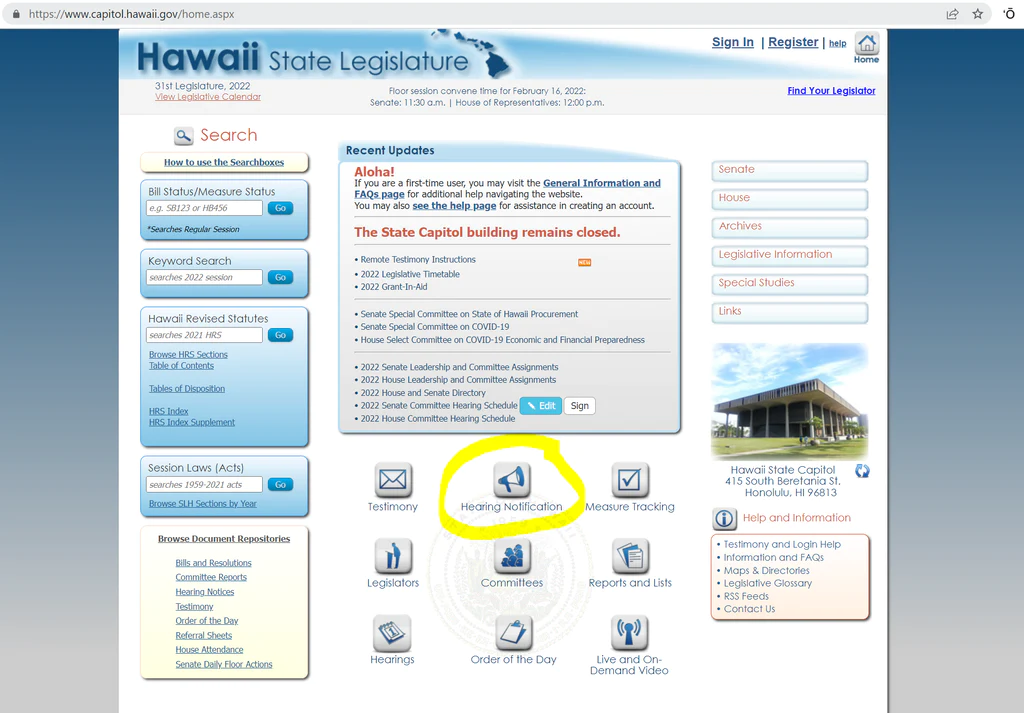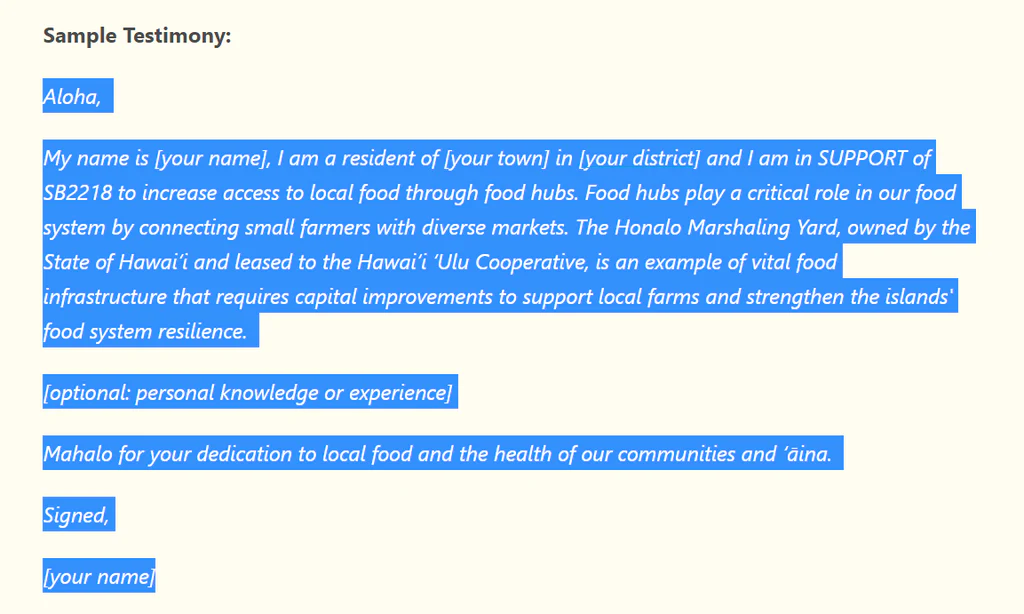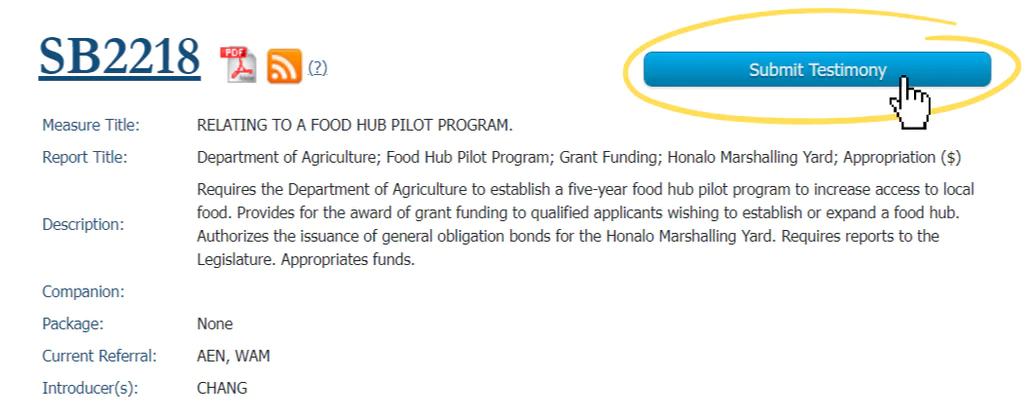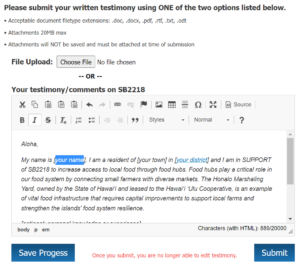7 Farm-Friendly Bills in the 2022 Legislature
Policy plays an important role in shaping our food systems and you can help shape Hawaiʻi’s current policy by using your voice. Even a one-sentence testimony counts and shows your commitment to the issues that are important to you.
Read this blog to learn more about how to get involved, what priority bills the ʻUlu Co-op is supporting this year, and to find sample testimony that makes testifying easy! Questions? Reach out to info@eatbreadfruit.com, we’re here to help!
Basic guide to submitting testimony in under 5 minutes:
- Create an Account at on the capitol website – Register Here.
- Sign up for Hearing Notices. Hearings are announced at minimum 72 hours before they take place; getting notifications straight to your email ensures you don’t miss a single one. See highlighted circle on screenshot of capitol site homepage below for where to sign up.
- Submit Written Testimony at least 24 hours before the hearing to be on time. (Late testimony can be submitted but will be stamped “late”).
- Copy sample testimony (scroll down for full list of sample testimonies)
Click the hyperlinked bill number to go to capitol website
Click “Submit Testimony”
Fill in your information and paste your testimony comments.
(Optional) Submit Oral Testimony during the hearing, up to 2 minutes in length.
HUC’s 2022 Priority Bills:
SB2218 – Relating to a Food Hub Pilot Program
(Testimony due by Wednesday, March 31, 2022 at 1:30 p.m. for upcoming hearing scheduled in the House Committee of Finance)
What the bill does:
Establishes a five-year food hub pilot program in the Department of Agriculture to increase access to local food. Provides for the award of grant funding to qualified applicants wishing to establish or expand a food hub. Authorizes the issuance of general obligation bonds for the Honalo Marshaling Yard. Requires reports to the Legislature. Appropriates funds.
Why we need it:
Food hubs play a critical role in our food system by connecting small farmers with diverse markets. Producers need tools like food hubs to reach the primary places where most consumers access their food. Additionally, the Honalo Marshaling Yard (owned by the State of Hawaiʻi and leased to HUC) needs critical infrastructure upgrades that would enable it to expand operations as a food hub consistent with the purposes of this Act.
Sample Testimony:
Aloha,
My name is [your name], I am a resident of [your town] in [your district] and I am in SUPPORT of SB2218 to increase access to local food through food hubs. Food hubs play a critical role in our food system by connecting small farmers with diverse markets. The Honalo Marshaling Yard, owned by the State of Hawaiʻi and leased to the Hawaiʻi ʻUlu Cooperative, is an example of vital food infrastructure that requires capital improvements to support local farms and strengthen the islands’ food system resilience.
[optional: personal knowledge or experience]
Mahalo for your dedication to local food and the health of our communities and ʻāina.
Signed,
[your name]
SB3198 – Relating to Capital Improvement Projects Benefiting Agriculture
What the bill does:
This bill identifies the infrastructure improvement needs of the Honalo Marshaling Yard, owned by the State of Hawaiʻi, to support the efforts of current leasee, Hawai‘i ʻUlu Co-op in providing fresh, nutritious Hawai‘i-grown products to our community.
Why we need it:
The Honalo Marshaling Yard facility was built nearly 30 years ago and is now in need of public investment to bring the facility back up to code, meet food safety requirements, and enable increased food production, aggregation, processing and storage – specifically of Hawaiʻi-grown staple crops, a critical part of our food system with demonstrated potential for both economic development and long-term food security and sustainability.
Sample Testimony:
Aloha,
My name is [your name], I am a resident of [your town] in [your district] and I am in SUPPORT of SB3198 to enable increased production and the scaling of local food industries that have demonstrated the potential for both economic development and long-term food security and sustainability.
[optional: personal knowledge or experience]
Mahalo for your dedication to local food and the health of our communities and ʻāina.
Signed,
[your name]
SB2982 – Relating to a Food Hub Pilot Program
What the bill does:
Requires the Department of Agriculture to establish a five-year food hub pilot program to increase access to local food. Provides for the award of grant funding to qualified applicants wishing to establish or expand a food hub. Requires reports to the Legislature. Makes an appropriation.
Why we need it:
A food hub is an exclusively regional aggregation and distribution center that efficiently facilitates consumer access to local food. Most of Hawaii’s farmers are small-scale and highly diversified. Food hubs allow farmers the time they need on the ‘āina by providing the infrastructure of aggregation, processing, marketing and distribution to get local products to market so the food producers can focus on growing their production. Food hubs return a greater portion of each dollar of value, about 70%, to the farmer – far more than conventional distributors of imported food do.
Sample Testimony:
Aloha,
My name is [your name], I am a resident of [your town] in [your district] and I am in SUPPORT of SB2982 to establish a food hub pilot program. Most of Hawaii’s farmers are small-scale and highly diversified. Food hubs can play a large role, allowing farmers the time they need on the ‘āina by providing the infrastructure of aggregation, processing, marketing and distribution. Food hubs get local products to market so the food producers can focus on growing their production.
[optional: personal knowledge or experience]
Mahalo for your dedication to local food and the health of our communities and ʻāina.
Signed,
[your name]
SB2891 – Relating to the Department of Education
What the bill does:
Directs and funds Department of Education to conduct a study to include food hubs in its procurement strategy for ‘Aina Pono DOE Farm to School.
Why we need it:
Food hubs must play a central and direct role in meeting Hawaii’s goals for increased local food procurement by Hawaiʻi Department of Education, thereby strengthening community food systems through the power of farm to school. This bill will support the inclusion of food hubs in DOE procurement strategies.
Sample Testimony:
Aloha,
My name is [your name], I am a resident of [your town] in [your district] and I am in SUPPORT of SB2891 to conduct a study on including food hubs in DOE Farm to School procurement. Food hubs must play a central and direct role in meeting Hawaii’s goals for increased local food procurement by Hawaiʻi Department of Education, thereby strengthening community food systems through the power of farm to school.
[optional: personal knowledge or experience]
Mahalo for your dedication to local food and the health of our communities and ʻāina.
Signed,
[your name]
HB1864 – Relating to School Food Programs
What the bill does:
Appropriates funds for school cafeteria upgrades and cafeteria staff training to improve the ability of the department of education’s school food programs to serve students fresh, locally grown foods.
Why we need it:
This bill will make the Act 175 goal of 30% local food in schools by 2030 possible by supporting necessary upgrades and training in school cafeterias.
Sample Testimony:
Aloha,
My name is [your name], I am a resident of [your town] in [your district] and I am in SUPPORT of HB1864 to support school cafeteria infrastructure and staff training to serve students fresh, locally grown foods. This bill will help us reach the Act 175 goal of 30% local food in schools by 2030 by supporting necessary upgrades and training in cafeterias.
[optional: personal knowledge or experience]
Mahalo for your dedication to local food and the health of our communities and ʻāina.
Signed,
[your name]
SB3002 – Relating to Procurement
What the bill does:
Provides additional guidance and updates the reporting obligations for state departments, including the Department of Education, pursuant to Acts 175 and 176 (SLH 2021), which established programmatic goals for the purchase and procurement of locally sourced products (30% food purchased from local sources by 2030).
Why we need it:
This bill will support the Act 175 goal of 30% local food in schools by 2030 by streamlining and standardizing DOE reporting obligations for Acts 175 and 176, Session Laws of Hawaii 2021. This additional guidance will allow the Department to better provide status updates on progress in meeting the local farm-to-school meal goals.
Sample Testimony:
Aloha,
My name is [your name], I am a resident of [your town] in [your district] and I am in SUPPORT of SB3002 which will assist the Department of Education’s School Food Services Branch to streamline and standardize reporting obligations for Acts 175 and 176, Session Laws of Hawaii 2021. This additional guidance will allow the Department to better provide status updates on our progress in meeting the local farm-to-school meal goals.
[optional: personal knowledge or experience]
Mahalo for your dedication to local food and the health of our communities and ʻāina.
Signed,
[your name]
HB2304 – Relating to Farm to School Program
What the bill does:
Secures additional resources for the Department of Education including a centralized food data system, training for staff on preparation and procurement and consultants to support plans of the program in all department schools.
Why we need it:
This bill will support the Act 175 goal of 30% local food in schools by 2030 by setting up the systems necessary to support the DOE in local food procurement and preparation.
Sample Testimony:
Aloha,
My name is [your name], I am a resident of [your town] in [your district] and I am in SUPPORT of HB2304. Supporting Farm to School procurement with a centralized food data system, staff training and consultants uplifts local farmers in the food system while benefiting the health of students and their families.
[optional: personal knowledge or experience]
Mahalo for your dedication to local food and the health of our communities and ʻāina.
Signed,
[your name]
